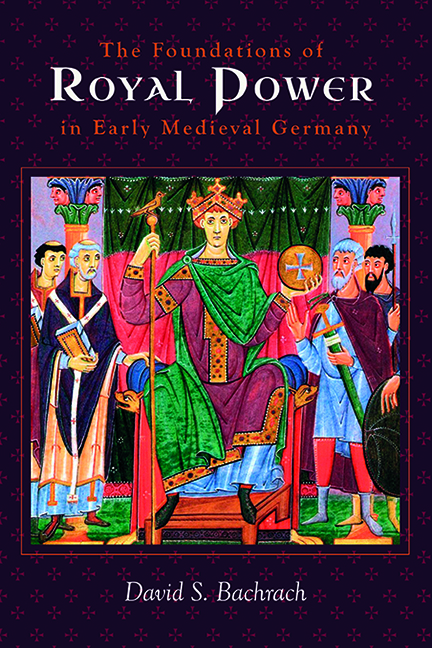 The Foundations of Royal Power in Early Medieval Germany
The Foundations of Royal Power in Early Medieval Germany Book contents
- Frontmatter
- Dedication
- Contents
- List of Illustrations
- Acknowledgments
- List of Abbreviations
- Maps
- Introduction
- 1 The Economy of Carolingian East Francia and Ottonian Germany
- 2 Material Assets of the Royal Fisc
- 3 Taxes, Tolls, and Other Regalian Rights
- 4 Ecclesiastical Resources at the Ruler’s Disposal
- 5 Toward an Analysis of Royal Expenditures: The Iter Regis and the Cost of Defense
- Conclusion
- Appendix 1 Fiscal Properties held by the Rulers of East Francia and Germany, 887–1106
- Appendix 2 Fortifications held by the Royal Government during the Reigns of Henry I and Otto I
- List of Key Terms
- List of Key Dates
- Bibliography
- Index
1 - The Economy of Carolingian East Francia and Ottonian Germany
Published online by Cambridge University Press: 16 July 2022
- Frontmatter
- Dedication
- Contents
- List of Illustrations
- Acknowledgments
- List of Abbreviations
- Maps
- Introduction
- 1 The Economy of Carolingian East Francia and Ottonian Germany
- 2 Material Assets of the Royal Fisc
- 3 Taxes, Tolls, and Other Regalian Rights
- 4 Ecclesiastical Resources at the Ruler’s Disposal
- 5 Toward an Analysis of Royal Expenditures: The Iter Regis and the Cost of Defense
- Conclusion
- Appendix 1 Fiscal Properties held by the Rulers of East Francia and Germany, 887–1106
- Appendix 2 Fortifications held by the Royal Government during the Reigns of Henry I and Otto I
- List of Key Terms
- List of Key Dates
- Bibliography
- Index
Summary
Understanding the nature and scale of the material resources available to the royal government under the Ottonian dynasty and their Carolingian predecessors requires developing a perspective on the state of the overall economy, meaning the aggregate production of goods and services. Equally important is an understanding of the economic trajectory of Francia orientalis and the German kingdom over the course of the ninth, tenth, and early eleventh centuries. If, on the one hand, the centuries after the dissolution of the Carolingian Empire in 840 were marked by demographic and economic stagnation or even decline resulting from foreign invasions, civil war, and the breakdown of government, it would be necessary to develop a model of royal resources that was predicated on limited means and horizons. Similarly, if the greatest sources of income and resources for the king as well as secular and ecclesiastical magnates consisted of plunder and tribute, this would have profound implications for the political and governmental authority of the ruler. By contrast, if during the period extending from the mid ninth to the early eleventh century the lands of the eastern realm enjoyed sustained or even robust demographic growth, increases in agricultural production, with the concomitant expansion of markets and trade, then such a finding would have equally profound implications for the resources available to the royal government as well as the relationships among the king, the magnates of the realm, and the broad base of the population. The following chapter, therefore, examines both the scholarly treatment of and the sources for the economy of the Carolingian and Ottonian Empires. A significant volume of information regarding economic matters can be developed from a wide range of written sources including both royal and “private” charters, capitularies, letters, and historiographical texts. Even more important, however, in understanding questions of demography, the wide range of economic activity in the eastern lands, and the scale of this economic activity, is the ever-expanding accumulation of material information through archaeological excavations.
Demography and Agricultural Production
The scholarly tradition considering the economic conditions of early medieval Europe, beginning with Henri Pirenne's Mahomet et Charlemagne, has largely treated market exchange, and particularly longdistance exchange, as the primary measure for gauging the health of the economy.
- Type
- Chapter
- Information
- The Foundations of Royal Power in Early Medieval GermanyMaterial Resources and Governmental Administration in a Carolingian Successor State, pp. 27 - 66Publisher: Boydell & BrewerPrint publication year: 2022


